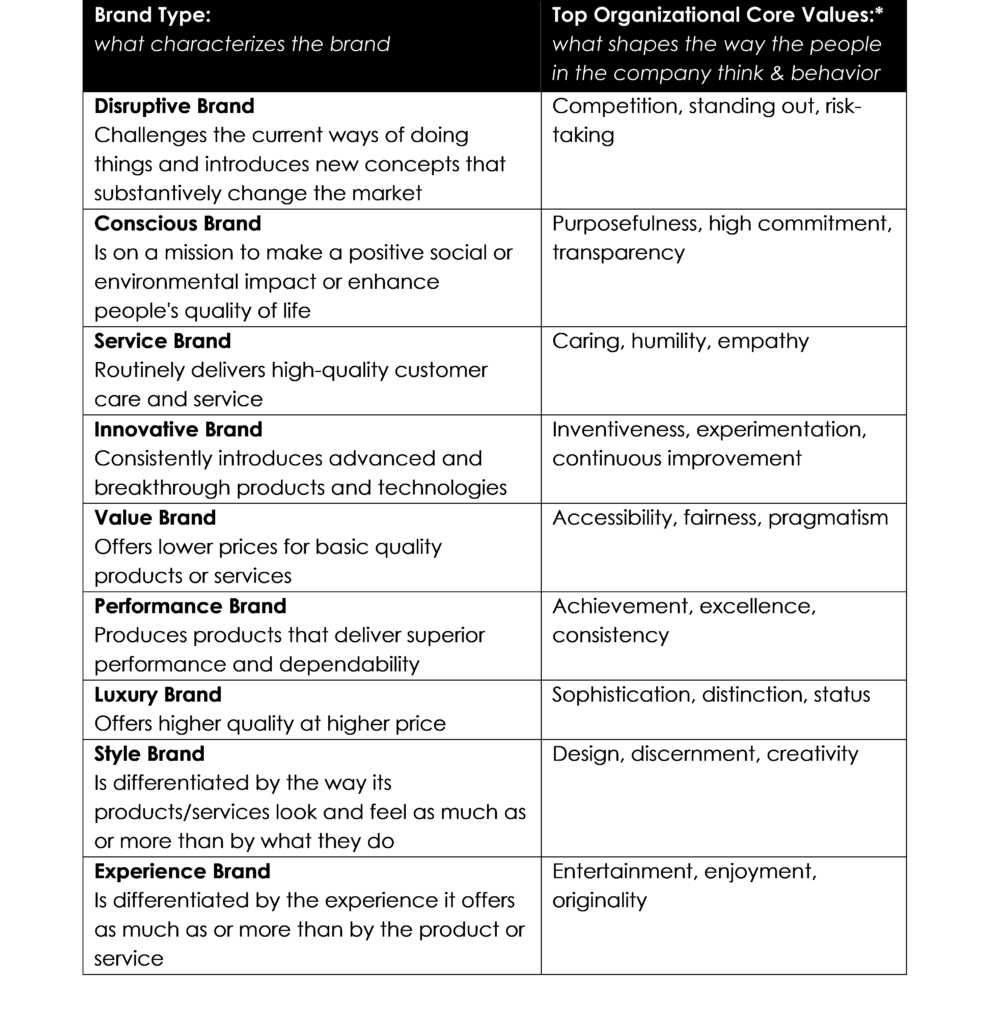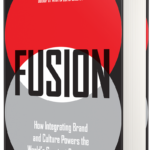These 27 Organizational Values Are the Key to a Healthy, Effective Culture and Powerful, Valuable Brand
In a previous post, I introduced the nine brand types that all brands fall into. I explained that in my years of experience working on a broad range of brands, I found that, although no two brands share the exact same brand identity, there are really only nine general brand types. This post is about the relationship between these brand types and the organizational values that support them.
Every organization needs to align its external brand identity and internal workplace culture. The fusion of brand and culture — the integration and alignment of how an organization is perceived and experienced on the outside and how it thinks and acts on the inside – enables you to create value for customers, employees, and all stakeholders; differentiates you and therefore gives you a sustainable competitive advantage; and future-proofs your business by shoring up your core strengths – a healthy, effective culture and a powerful, valuable brand. (For more on this topic, please check out my book FUSION: How Integrating Brand and Culture Powers the World’s Greatest Companies.)
One of the first steps to achieving Brand-Culture Fusion is to know what kind of culture you should have. And for that, I recommend you examine your brand type. Each brand type requires a specific organizational culture to support and advance it, so once you know the general type of your brand (or the brand you desire to have), you’ll can isolate the kinds of organizational values you need. And if you know the types of values you should have, you can design the other aspects of your culture to align with, build on, and reinforce them. That’s the starting point for cultivating your desired culture and ultimately achieving Brand-Culture Fusion.
I developed the list of brand types and the corresponding values through research from many of the top organizational culture researchers and consulting firms including Barrett Values Centre, OCAI, Denison, and Human Synergistics, as well as input from thought-leaders and practitioners in culture-building many of whom are readers of this blog and my newsletter. Here are the three top organizational values for each brand type that are most likely to help it thrive:
 The list is by necessity a generic collection of broad organizational values. Every company should have values that are distinct to it or at least expressed in a unique way. But I couldn’t offer a more comprehensive or nuanced list of values, given that the possibilities for unique values are endless. The intent is for you to use the list as a springboard, and that you’ll be able to derive unique values for your organization by starting with these. Plus you’ll need to flesh them out into a full set of core values, articulating them in unique ways, defining what they mean in your organization, and tying them to specific behaviors.
The list is by necessity a generic collection of broad organizational values. Every company should have values that are distinct to it or at least expressed in a unique way. But I couldn’t offer a more comprehensive or nuanced list of values, given that the possibilities for unique values are endless. The intent is for you to use the list as a springboard, and that you’ll be able to derive unique values for your organization by starting with these. Plus you’ll need to flesh them out into a full set of core values, articulating them in unique ways, defining what they mean in your organization, and tying them to specific behaviors.
But this is a start – and I hope, by tying organizational values and brand types together, I’ve gotten you started on the journey to Brand-Culture Fusion.
P.S. You might want to check out the Brand-Culture Fusion Assessment – it’s a free online tool that will take you through the process of identifying your existing brand type, your desired brand type, and the organizational values you need to develop to close the gap between the two.
related:



What Are Core Values and How Should You Develop Them
*Here are brief explanations of the values:
Accessibility—people at your company make themselves easy to understand and engage with, regardless of rank or role.
Achievement—people at your company focus on the successful attainment of goals typically by effort, courage, or skill.
Caring—people at your company consistently display kindness and concern for others.
Competition—people at your company strive to win or be more successful than others.
Consistency—people at your company adhere steadfastly to the same principles, course, or form.
Continuous improvement—people at your company engage in ongoing efforts to improve products, services, or processes.
Creativity—people at your company rely on imagination or foster original ideas.
Design—people at your company focus on the look, style, or fashion of everything they do or produce.
Discernment—people at your company emphasize using acute judgment and discretion.
Distinction—people at your company like to set its brand apart from the competition clearly and deliberately.
Empathy—people at your company try to put themselves in other people’s shoes—especially those of other employees and customers.
Enjoyment—people at your company go out of their way to have fun and seek out delight.
Entertainment—people at your company emphasize amusement or celebration.
Excellence—people at your company try to be outstanding or to meet the highest standards.
Experimentation—people at your company experiment with new methods and approaches, knowing some will fail.
Fairness—people at your company go out of their way to act without bias or partiality.
High commitment—people at your company believe in acting with intense and ironclad dedication to a purpose.
Humility—people at your company believe in adopting a modest or low view of one’s own importance.
Inventiveness—people at your company like to create new things with imagination.
Originality—people at your company champion independence, creativity, and fresh perspectives.
Pragmatism—people at your company deal with things sensibly and realistically and try to find the most practical way to do things.
Purposefulness—people at your company pursue its goals with intention and determination.
Risk-taking— people at your company engage in activities that involve danger or risk in order to achieve a goal.
Sophistication—people at your company rely on social or esthetic standards to discriminate between options.
Standing out—people at your company attract attention to it by being particularly noticeable or different.
Status—people at your company care about the relative social standing of people and things.
Transparency—people at your company do things openly and in a straightforward way.